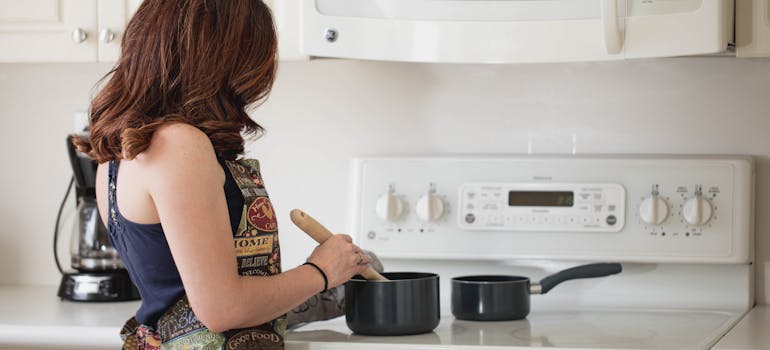Moving out of your parents’ house is a big step and can be very exciting. However, this excitement comes with a dose of fear, which is natural. It’s a sign of independence and the beginning of a new chapter in your life. Whether you’re moving for work, school, or just to gain more freedom, there are many things to consider. To navigate this transition in the smoothest way possible, there are a few practical tips and advice you should know.
Assess your readiness
Before you move out of your childhood home, it’s important to see if you’re ready for such a move. Here are some key areas to consider:
- Emotional readiness: Are you prepared to handle the responsibilities and potential loneliness of living independently?
- Financial stability: Do you have a stable income to cover rent, bills, and other expenses?
- Life skills: Can you cook, clean, and manage basic household tasks on your own?
- Support system: Do you have friends or family nearby who can offer support if needed?
- plans: Have you thought about your long-term goals and how this move fits into them?
Once you evaluate these aspects, you can determine if you’re truly ready to take this significant step toward independence.

Financial planning
You must plan your finances before moving out of your parents’ house. Start by creating a budget that includes rent, utilities, groceries, and other living expenses. Don’t forget to account for one-time costs like security deposits and moving supplies. It’s wise to have an emergency fund to cover unexpected expenses, such as medical bills or urgent repairs.
To save money, look for ways to cut down on unnecessary expenses and consider sharing costs with a roommate. When hiring movers, compare prices and services to get the best deal. For instance, if you’re moving to Washington, DC, you might want to check out DC apartment movers for affordable and reliable services. Proper financial planning ensures that you can handle the costs of living independently without unnecessary stress.
Decluttering and packing
Preparing for the move involves decluttering and packing efficiently. Here’s a simple checklist to help:
- Sort your belongings. Decide what to keep, donate, sell, or discard.
- Gather packing supplies. Get boxes, tape, bubble wrap, and markers.
- Pack room by room. Start with non-essential items and move to everyday essentials.
- Label everything. Mark boxes with their contents and the room they belong to.
- Create an essentials box. Include items you’ll need immediately, like toiletries, chargers, and a change of clothes.
- Secure valuables. Keep important documents, jewelry, and other valuables in a safe place.
This approach will help you stay organized and reduce stress on a moving day.
Finding the right place before moving out of your parents’ house
Choosing the right place to live matters more than you think, because it will be the first nest you will build on your own. Start by researching different neighborhoods to find one that fits your lifestyle and budget. Consider proximity to work, public transportation, and amenities like grocery stores and parks. Decide whether renting or buying is the best option for you based on your financial situation and long-term plans.
Once you’ve identified potential areas, use online resources and apps to find available housing. Schedule visits to see the places in person and get a feel for the neighborhood. If you intend to hire local movers DC has to offer, you can ask them to tell you more about the area where your new home is located. All that will help you settle in and adjust to your new surroundings easier.

Moving day logistics
Moving day can be hectic, but good planning makes it easier. Start by packing a bag with essentials like toiletries, a change of clothes, important documents, and snacks. This way, you have what you need immediately upon arrival without digging through boxes.
If you’re hiring a moving company, choose a reliable one to ensure your belongings are handled with care. For example, Washington DC movers are known for their professionalism and efficiency, making your move smoother. Label your boxes clearly and keep an inventory of what you’ve packed.
Additionally, coordinate with friends or family who can help on moving day, especially for tasks like dismantling furniture or transporting fragile items. This teamwork can save you time and reduce stress.
Setting up your new home
After moving in, the first step is to set up your utilities, such as electricity, water, and internet. Contact providers to schedule installations so you can settle in without delays. Next, prioritize essential furniture and household items. Start with basics like a bed, seating, and kitchen essentials before moving on to decor and less urgent items. If you need help with heavy lifting or arranging furniture, consider hiring movers DC area residents trust for their expertise and efficiency. They can assist in making your new place feel like home more quickly. Afterward, you can personalize your space with items that reflect your style and make you comfortable. For example, plants, pictures, and cozy textiles can make a big difference. Creating a functional and inviting space will help you feel more at ease in your new home.
Managing daily life and responsibilities
When you’ve settled in your job will be to manage your daily life as efficiently as possible. Here are some tips to help you stay on track:
- Establish a routine. Create a daily schedule for work, chores, and relaxation.
- Stay organized. Keep a calendar or planner to track appointments and tasks.
- Budget wisely. Monitor your spending and stick to your budget.
- Household maintenance. Regularly clean and maintain your living space.
- Self-care. Make time for exercise, hobbies, and socializing to maintain a balanced lifestyle.
- Learn basic repairs. Know how to handle minor household issues or have a list of reliable contacts.
Following these tips will help you manage your new responsibilities and enjoy your independence.

Embracing your new independence
Moving out of your parents’ house is a significant milestone. It comes with a mix of challenges and rewards. However, planning carefully, managing your finances, and setting up your new space thoughtfully, can help make this change a positive and empowering experience. Embrace your new independence and enjoy the journey of creating a home that reflects your personality and meets your needs.


